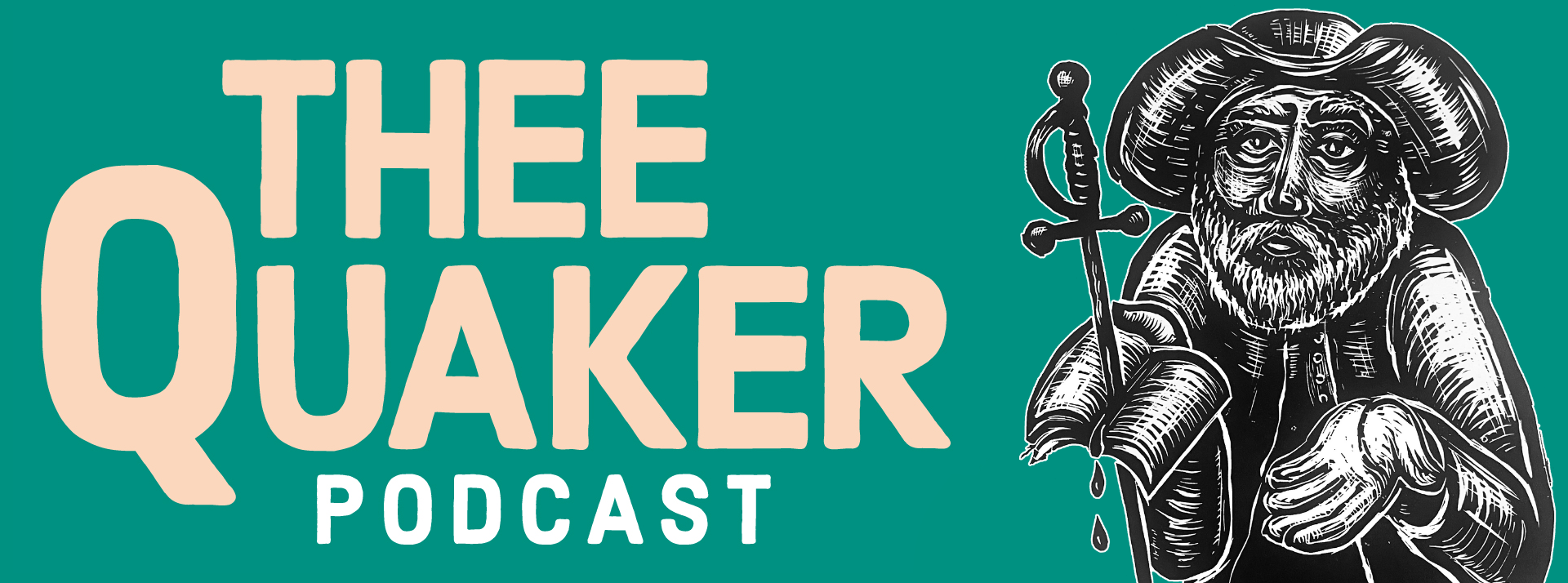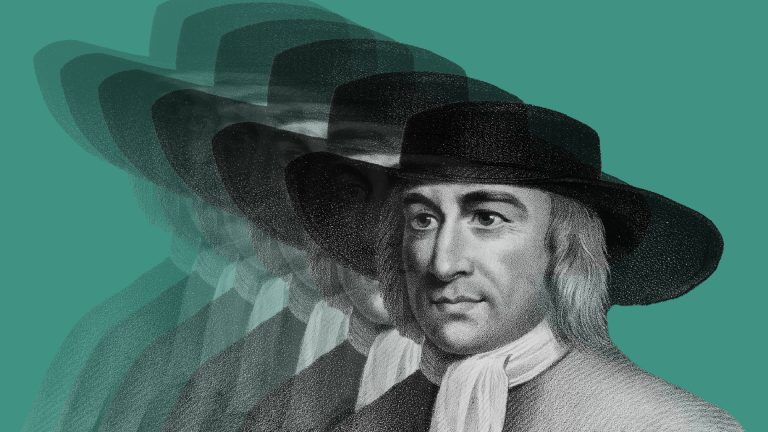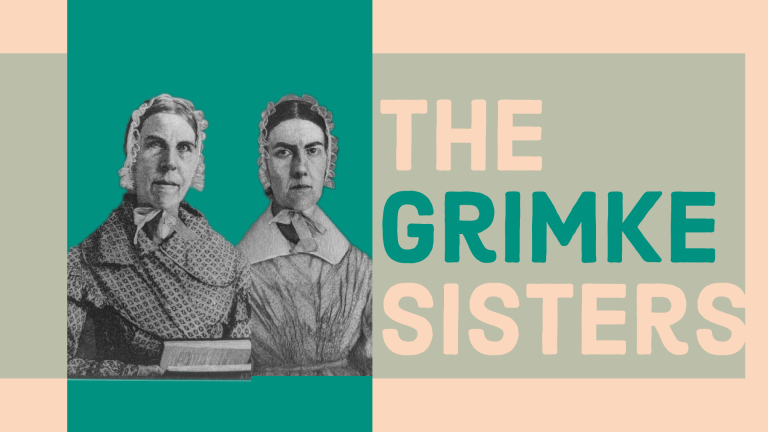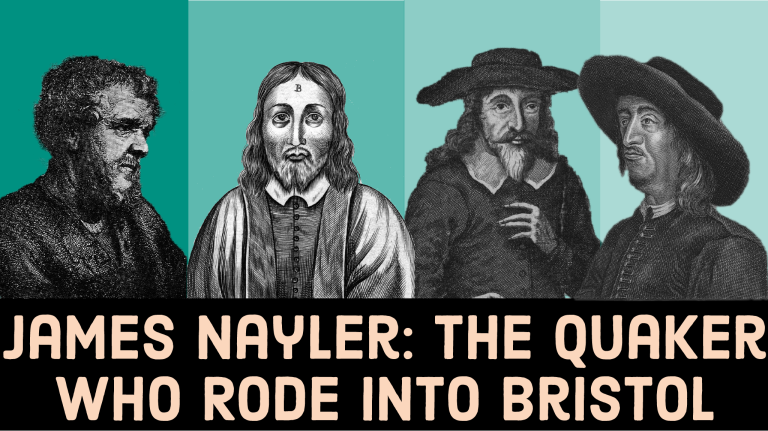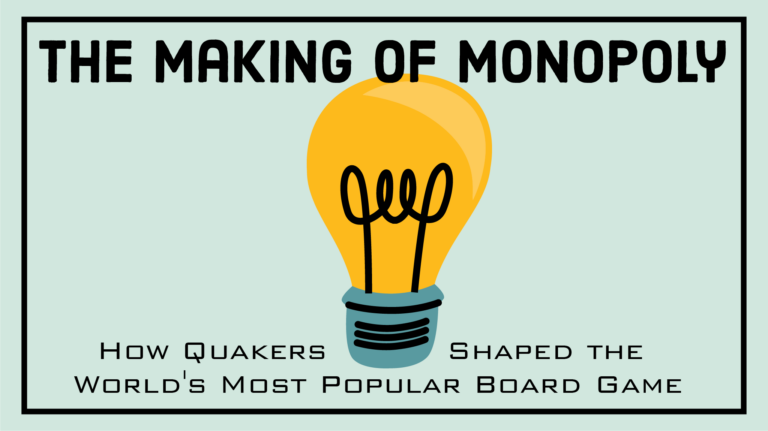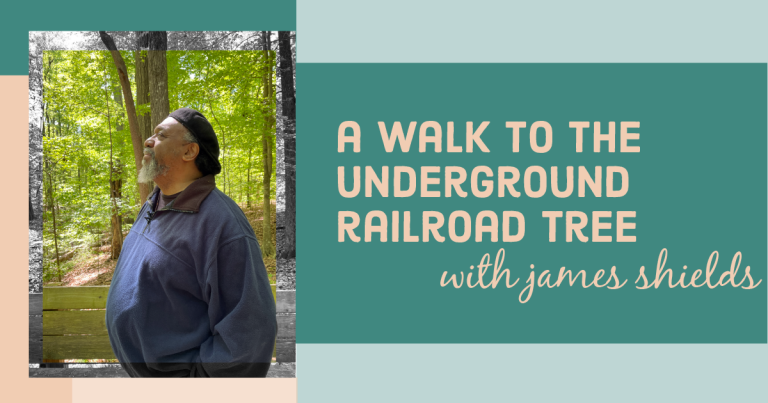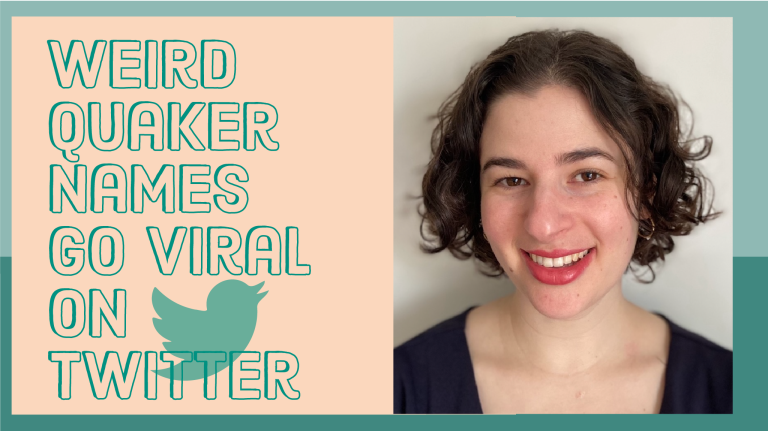Before Quakers Were Abolitionists: The Germantown Quaker Petition Against Slavery
Quakers are widely known for being early and outspoken abolitionists, and while that is true, it is not the whole story. Join us as we explore the Germantown Quaker Petition Against Slavery, its delayed impact, and the people who continued to fight the good fight even after many believed that it was already won.
High Definition scan of the 1688 Germantown Quaker Petition Against Slavery
The Grimke Sisters: How Two Southern Slave-Owning Quakers Became America’s Fiercest Abolitionists
Subscribe so you don’t miss an episode!
Leave a comment below to share your stories and thoughts!
This episode is brought to you by Olney Friends School. Located on a 350 acre campus in Barnesville Ohio, Olney Friends School is a leading Quaker day and boarding school that boasts a 3:1 student to teacher ratio and a 100% college acceptance rate. Since 1837, Olney has pioneered a progressive educational model that adapts to each student’s unique needs. Their flexible, project-based curriculum blends mastery learning with intellectual exploration, preparing diverse learners for college success and lifelong curiosity.
To enroll your student or to learn more, visit olneyfriends.org.
DISCUSSION QUESTIONS:
- The episode opens by contrasting the “simple, heroic story” we tell about our movements with the “messier, more complicated” truth. Why do you think we are drawn to simpler narratives? In what ways does the messier story of Quaker abolitionism prove more “useful” for us today?
- The Quaker leadership of 1688, when faced with the petition, decided it was “too weighty” and passed it up the chain until it was effectively shelved. Mary Crauderueff connects this to the harm that happens today when marginalized groups are forced to wait for institutional process. Can you think of modern examples where “justice delayed is justice denied”?
- Like our forebears, what matters of justice might we be too comfortable with today?
Zack Jackson
Hey friends, Zack here. Before we get started, I wanted to take a moment and just say thank you. Seriously. The support from this community has been inspirational to say the least, and I have cherished the messages I’ve received about how much this podcast has meant to you and how it has contributed to your spiritual journey. Thee Quaker Podcast is listener-supported, so your generosity is the reason that we get to tell these stories.
And that’s why I’m so excited to tell you about our supporter drive. Our goal is to welcome 100 new supporters to the team by the end of September. As a personal thank you from us, anyone who joins at the $10 level or more will get a limited edition Benjamin Lay mug to commemorate season 3. Benjamin Lay famously smashed his wife’s teacups to protest the exploitative tea and sugar industries, and his voice still echoes to remind us to think deeply about the ethics of what we put in our mugs.
Reaching this goal means that we can continue to tell these stories of spiritual courage and give Quakerism a platform for the 21st century. I have so many stories I cannot wait to tell and interviews I want to share with you. You make that future possible. If this show has contributed to your spiritual journey, please consider going to QuakerPodcast.com and clicking support. Thank you, truly. And now, here’s the show.
Zack Jackson
Every family, every organization, every movement, has a story that it tells about itself. More often than not. It’s a simple, heroic story. One of the most common stories around Quakers is that they were the original abolitionists, long before anyone else Quakers were fighting to free enslaved people and to end the Trans Atlantic slave trade altogether. But the truth is never that simple. The real story is always messier, more complicated, and honestly, I think, more useful, because if we allow our histories to be complex, then we allow our heroes to be fallible, and then we can find a road map for ourselves as we face the moral initiatives of our time.
In the case of Quakers and abolition, there was a long, winding road with safety and courage in a decades-long tug-of-war. There were rabble-rousers who risked everything to challenge those around them to do the right thing. Next week, we are exploring the story of one of those rabble-rousers, a guy named Benjamin Lay. But this week: the context. What did things look like before Quakers were abolitionists?
In an attempt to go back to the beginning, I went to Haverford College into the climate controlled quiet of their special collections to see a single sheet of paper that started it all: The Germantown Petition.
Mary Crauderueff
I’m Mary Crauderueff, curator of Quaker collections at Haverford College.
Zack Jackson
So, what can you tell me? What can you tell me about the story of this?
Mary Crauderueff
Sure. So this is the Germantown petition of 1688. This is the first known protest against slavery written by colonizers. It was written in 1688, in the Germantown neighborhood of Philadelphia, by a set of neighbors and people who were worshiping together, who were Quakers at that point.
Zack Jackson
The first known collective protest against slavery written by European colonists in America, 69 years after the first slave ship arrived on the shores. It’s an incredible thing to sit in front of. I wanted to understand it, not just as a historical event, but as a physical object that survived for over three centuries. So Mary described what we were looking at.
Mary Crauderueff
So the document itself is one sheet of paper. It is about seven inches wide and 14-ish inches long. It is kind of like a beige-ish color, and it is now flat and housed in a mylar protective sleeve. But from the paper itself, it is clear that it was folded, at least in quarters, if not more, for a long period of time and the paper is brittle, and so repairs have been made to the piece. So the handwriting is this beautiful cursive handwriting that’s a little bit hard to read for most of the document, and it’s, it’s like a pale black like you can definitely tell that it’s really faded.
Zack Jackson
She points to the bottom of the page where the names are signed.
Mary Crauderueff
And then the signatures themselves, they must have re-upped the ink or used a different you know, it’s very different ink. It has sort of etched away some of the paper over time.
Zack Jackson
The text itself is a beautiful but faded cursive, and you can see them editing their own work in real time,
Mary Crauderueff
but you can see that there is a little bit of revision as they’re going. It says this was, and then scratch off is, and then from and then this word is scratched out meeting at Germantown. You know, I haven’t for a long time tried to see what that word is. I think it says monthly it says monthly meeting. So technically, it was not, this was just a group of people meeting. It was not actually a monthly meeting. And so I’m guessing that that ink looks very close to the ink that was used to say that it was brought to the monthly meeting at Dublin. And so I wonder if, since it was brought to this monthly meeting, they were like, well, you’re not a monthly meeting. We’re just gonna fix that for you. Unclear. Unclear. I’m not in their heads. I’m not in their heads.
Zack Jackson
This small correction made over 300 years ago tells a story that still resonates today. This wasn’t an official Quaker meeting. It was just a group of German and Dutch immigrants who had started their own gathering in the Germantown neighborhood of Philadelphia. They didn’t come from England, and they weren’t well connected with the powerful Quakers in the city. They were, as Education Manager at Arch Street meetinghouse, Jennifer Gray explains, outsiders to the system.
Jennifer Gray
These individuals that settled in what is now Germantown. They are from areas of Europe where slave holding was not a common practice, and they arrive here and see it so commonplace, and they are seeing it for what it is. And said, Guys, this goes against the faith, and this is something that we need to address
Zack Jackson
But as Mary explains, their argument against it was not what we might expect today, after a brief appeal to the golden rule,
Mary Crauderueff
the reasoning that’s given for it is that for Quakers to continue to be Enslavers, if the person that they have enslaved does something wrong, and the enslaver feels as though they need to punish them physically, then that comes to the harm of the Quakers soul, right? So this is not a oh, we should not be enslaving people because of their humanity and because we believe that they are truly equal to us, but it’s because it comes to a harm to my soul, and I think that that is something that is a really important piece not to lose in this arc as well. In 1688, this was not a petition that said, everybody should be equal. We should not be enslaving people. This. There was still a lot of work to be done.
Zack Jackson
They took this imperfect but revolutionary petition up the ladder of Quaker leadership, since their unofficial meeting had no real standing, they brought it to the Dublin monthly meeting for consideration. Having heard the petition, they decided that it was too weighty a matter for them to consider, and they sent it up to the Philadelphia quarterly meeting. The quarterly meeting read the petition and likewise, passed it along to the yearly meeting, which is just about as far up in the chain as you could go in those days. The document itself holds this history frozen like a sort of parody of process. Under the original signatories, the clerk of the Dublin meeting wrote their decision to pass it and along under him in smaller, more uneven handwriting, the clerk of the quarterly meeting wrote their decision with every last bit of blank space that was left at the bottom of the page. The decision coming from the Philadelphia yearly meeting is recorded only in the minutes
Mary Crauderueff
that says a paper being here presented by some German friends concerning the lawfulness and unlawfulness of buying and keeping Negroes. It was adjudicated not to be so proper for this meeting to give a positive judgment in the case it having so general a relation to many other parts, and therefore, at present, they forbear it. Now, can you tell me what that means?
Zack Jackson
They said, this is going to make a lot of powerful people mad. Let’s kick it down the road and make it someone else’s problem.
Mary Crauderueff
Yes, and like, we’re gonna put it in a drawer somewhere, right? We’re gonna fold this back up and put it back in in a place where maybe someone will find it when you know, we’ve all waited for that one person or that group of people to leave the meeting, for them to age out and pass away at, you know, very old ages before we make a grand decision about something. And I think that we see this evidence here.
Zack Jackson 09:09
The institution, faced with a moral crisis, chose to do nothing, and many of you are likely unsurprised. Institutions are, by design, slow to change, but who bears the burden of that slowness and who unknowingly benefits? I asked that question to Dwight Dunston, who in addition to being an artist and facilitator is the host of The Seed: Conversations for Radical Hope, which is a Quaker Podcast out of Pendle Hill.
Dwight Dunston
Who benefits from us not being comfortable with change as a body, as a Quaker body? Who benefits or who is harmed or who gets ostracized from an inability to be really able to sit with change and be with change?
I think if we look at that it would be marginalized communities. I think that’s just true throughout history. Like if you’re open to change and back to you know sort of where this combo started, abolition, if you’re reluctant to change the enslaved Africans are the people who suffer the most, right?
Zack Jackson
The institution had failed. So what happens when the system refuses to lead? The story of individuals who refuse to wait after the break.
Midroll Ad
Zack Jackson: This episode is brought to you by Olney Friends School. Located on a 350 acre campus in Barnesville Ohio, Olney Friends School is a leading Quaker day and boarding school that boasts an impressive 3:1 student to teacher ratio and a 100% college acceptance rate. But instead of telling you about their flexible learning model or their excellent faculty, I wanted to get an inside look into what it’s like to be a student there. So Olney Friends School graciously connected me with two very bright students.
Cresslin: Hi, my name is Cresslin, and I’m a rising junior.
Denise: Hi, my name is Denise, and I’m a rising senior
Zack Jackson: Thanks for taking the time to chat! So, be honest. What is it like at Olney?
Denise: It’s unique. It’s but in the best way possible. It’s like a mix and match of everyone, but with enough space for everyone.
Cresslin: Yeah, and kids from all over the world come here to do education, and they share their cultures, and I absolutely love that.
Zack Jackson: So, from an academic standpoint, can you tell me a little about the teachers?
Denise: Because we have that kind of connection, that kind of unity, where you and I can speak like, you know, we’re equals on the table. We speak about so many things that are relevant as well into the class, right?
Cresslin: Our classes are very adaptable in the sense that they’re not just teaching you off of a textbook, they’re teaching you with relevance to today’s world, right? And so, like, they don’t use just a textbook. They use, like, their actual knowledge.
Zack Jackson: OK So one final question. I know that Community is one of the most important Quaker testimonies so can you tell me a little about what it’s like to be a part of this community
Cresslin: Before I came to only, I went to a normal public school where I was bullied relentlessly, and that was the main reason why I came to only, and so I didn’t know what community really was, but the community here, it really has changed my life in ways that I cannot explain in words.
Denise: This place, it has helped me grow, and it’s nurtured me to just be myself without being scared. I think you said it perfectly. I mean, because it’s important that you are growing, especially at our ages, in an environment that’s welcoming of that nature, where people were with you want to see you thrive. Want to see you be the best version of yourself. And that’s exactly how I would describe only to thee, because that’s exactly how it makes me feel, at least that’s how it makes all of us feel. It makes everyone feel so welcome.
Zack Jackson: Thank you girls for taking the time to share your experience with us. Olney Friends school truly is a unique high school, housing students from all over the world, providing top notch education, and creating a safe environment for teenagers to become their best selves. To enroll your student or to learn more, visit olneyfriends.org. Again, thats olneyfriends.org. Link in the description. And now, back to the show.
Zack Jackson
Welcome back. Before the break, the Quaker leadership of 1688, faced with a clear moral challenge, chose to do nothing, but Justice delayed is justice denied. It is never neutral. It has a cost. Inaction is an action and it has consequences, and in the 88 years that followed, the Quaker community would pay the moral cost. The problem of slavery didn’t just stay the same, it got profoundly worse. I asked Jennifer Gray what that cost looked like.
Jennifer Gray
Fast forward a couple generations. So 1730s ish, 1740s somewhere in there, over half the Quakers in Philadelphia enslaved others.
Zack Jackson
This is the world that the next generation of activists were born into. Not just an institution that was silent, but a community where slave holding had become the norm for the majority of its powerful members. They weren’t just trying to start a movement. They were trying to reverse a deeply embedded, profitable and widely accepted practice. This is where two individuals with very different strategies begin to chip away at the foundation. One was a law breaker, the other a custom breaker. The law breaker was Benjamin Lay; he was a radical Prophet known for disruptive, theatrical protests. He once smashed his wife’s fine china to protest the sin of luxury built on slavery. He once plunged a sword into what looked like a Bible filled with red juice, splattering the slave owners with blood around him. He is the man who is on this season’s thumbnail. So make sure you tune in next week for a whole episode about him. Benjamin Lay was trying to shock the Quaker community out of the moral slumber that had set in during the past century. Jennifer says he knew he probably couldn’t convince the people in power so…
Jennifer Gray
So I think Benjamin saw that the people he was up against were richer, more powerful and powerful within the Quaker fold and outside of it, and they were part of the problem, but he also saw that they were his generation, maybe slightly younger. So he said, Okay, I’m never gonna see change in my lifetime. I’ve come to terms with that. I can start making change on a small, micro level and educating that younger generation that does have an open mind and open ears.
Zack Jackson
One of those people with an open mind was Anthony Benezet. He was the custom breaker. Benezet wasn’t staging public protests. His radical act was education, which challenged the unwritten laws of the white supremacist hierarchy.
Jennifer Gray
Anthony Benezet was a Quaker school teacher in Philadelphia, and he was a protege, if you will, of Benjamin lay and Anthony Benezet was about education, and he believed that everybody had the right to an education regardless of the color of their skin. And his schoolhouse in Philadelphia, he rented it out to the Free African Society so they could have their meetings there because they couldn’t get anywhere else. And he said, Yeah, absolutely. And by him focusing on education and publications, you know, he published things, I think, both under and outside of the care of his meeting that was all about this concept that we are all you know, people that deserve the right to learn and to read and write and all these things which we’re talking 1750s I mean, this is 1750s 1760s is a revolutionary idea.
Zack Jackson
Now, of course, there were more than just two people who were at work during this time, but they serve as helpful archetypes. The work of these two types of activists, the one loudly breaking the laws and the one quietly and relationally breaking social norms, eventually changed enough hearts to make a difference by 1776 the Yearly Meeting that had put the 1688 petition on ice finally banned slave holding for its members. But while the institution finally changed its internal rules, the consequences of that 88 year delay couldn’t be erased overnight. You can ban an evil practice, but you can’t easily ban the prejudice that was allowed to fester for nearly a century. And Jennifer Gray says this is where Quakers fell into a trap that is still incredibly common today.
Jennifer Gray
A lot of Quakers felt, it seems they felt that in 1776 they agreed that slave holding was no longer going to be tolerated. They thought that their job was done. We’ve agreed that enslaving others is bad. We’re not going to permit that anymore, and they’re addressing literally, the idea of enslaving others. But there’s a huge difference between being anti slavery and pro abolition, and that’s the crux of the problem for the next 100 years.
Zack Jackson
They had changed the rule, but not the culture. The evidence was right there in Arch Street meetinghouse where black Quakers like Sarah Mapps Douglass were forced to sit on a segregated bench. It took another generation of activists like the Grimke sisters to realize that their own movement for justice was exclusionary. We have a great episode on the Grimke sisters in season one. We’ll put a link in the description. Jennifer says that they had a startling realization that many activists still have today.
Jennifer Gray
So Sarah and Angelina Grimke, they were from South Carolina, moved to Philadelphia as young, single, unmarried women, and it was through their friendship with Sarah Mapps Douglass that the Grimke sisters acknowledged their prejudice. They acknowledged that they had been raised in an environment that you do have this segregation and this separation, and that if you are talking about abolition, you need to involve that other community. There is this huge free black community in Philadelphia. Why are they not part of these conversations that these Quaker women are having?
Jennifer Gray
I love the there’s a note that one of them wrote, or in one of their diaries, when the Grimke sisters went on their speaking tour, and it was 1836 they went up to New England, and it was their first or second meeting. They looked around the room, and it’s all white people, it’s all white women. And they saw that, and they knew immediately, this isn’t right. Where’s the free community that is undoubtedly in this area, where are they? Why are they part of this conversation? And all, like, the people in attendance at those meetings were like, What are you talking about? Like, they just, they were, like, blinded by it. They didn’t see it. And the Grimke sisters, it took them a while to see it, but when they did, they then were very vocal about saying, No, you have to get this other community involved. They have power and independence and clout and experience that we don’t have. We’re working on the same goal, join forces.
Zack Jackson
So what can we take away from this messy and complicated story with its mixed motives, imperfect ideals, bravery, and cowardice? What do we hold on to and what wisdom is there for our own times? It comes back, in many ways, to our local communities and how we handle conflict. Like giant sequoias whose seeds will not open without fire, so too, we will not make meaningful change without conflict. But, conflict is frightening, and it makes people feel unsafe. Sometimes it feels like we have to choose between unity and truth telling, but there is a deep wisdom tradition within Quakerism that demonstrates another way.
Dwight Dunston
You know, I really value Quakerism for really embodying that verse in Matthew, you know, where two or three are gathered. You know, there I am in the midst. It’s Quakers are like when we come together. We can do this. That’s the body of the church right there. When we come together and sit in worship, that’s where we can really hear God. That’s where that’s where, you know, God lives somewhere between us, but you know, in us, but also, like, maybe we can hear God even more when we’re silent together. So I think a lot about, how do I be anti racist? How do I move towards creating a more just loving, beloved community, right? I’m like, How are we doing that in relationship with other folks? You know, I have my own inward work to do. Like, can I get a friend to give me some reflection back about what they see? My gifts are where they see, my strengths are where they see, places that I’m still needing to grow and shift and change.
Zack Jackson
Study after study has shown that people don’t make meaningful internal change because they’ve been presented with facts, but rather when they are in relationships where they are safe to change. So if we are going to root out our own embedded prejudices, it must be done within a community where people feel safe to be themselves, where they know that the divine within them is known and honored and their experience is validated.
Dwight Dunston
The second thing I’ll share, which feels harder to say, and it makes me feel emotional, but and it’s so simple, I want I’ve dream of a community that can hold each other’s tears, that can cry together and be in grief together and not be afraid of what of of one another’s grief, and, yeah, not shrink in the face of it, and to be, to be really present for it, and to be present for when the grief turns in the rage or the, you know, there’s no grief, but just rage, you know, anger around what, whatever might be true for a person or persons, but they can really just hold it.
Zack Jackson
Many people have experienced the healing powers of Quaker communities, but others have been met with resistance and entrenched, unspoken power dynamics. In some ways, it’s easier to have large-scale change in a hierarchical system where the power brokers openly wield their authority and make declarations and policies that everyone has to follow. But easier isn’t necessarily better. Quaker communities operate by the principle that we can only discern the movement of the Spirit when we discern together, but as Dwight points out, sometimes, acting as if we don’t have power dynamics makes us more vulnerable to them.
Dwight Dunston
We got to look at how we relate to power, because I think in our DNA, there’s a skepticism about power in our spiritual DNA. George Fox was skeptical about the people in power. Many early Quakers were, early friends were and I think that you can take it, you can take something so far, and then it becomes, then our ability to talk about power, we kind of lose that as well. So a Quaker who says like, we don’t trust power, we don’t see power, we don’t even have hierarchy here. You know, very quickly that kind of falls apart once you were really to have a conversation about power and hierarchy, and that’s where I’m like, let’s, let’s have the convo there. Let’s talk about power and hierarchy and not and not say it’s not here, like it is here, people will tell you it’s here. I think you could, you could ask many Quakers who have a marginalized identity how power shows up, how they’ve experienced power in Quaker spaces, and I think they’ll have different responses and reflections than maybe a Quaker with less of those identities, right? Like, if we don’t believe in power or believe it’s bad, we never get to really interrogate it and really think about how we want to wield it and really claim it. Because I think, I think we do want to be powerful, but we want to be powerful in a generative, life giving way. And that just takes some more, some more intention.
Zack Jackson
To quote Dr. King, “True peace is not merely the absence of tension; it is the presence of justice”. The four men who signed the 1688 Germantown Petition Against Slavery understood that sometimes tension is necessary to bring about true peace, and despite the institution’s tendency towards a comfortable complacency, countless Quakers have stood up and chosen tension over their own privileged silence. Next week, we’re going to do a deep dive into Benjamin Lay, a man who created more tension than just about anyone else in the 1700’s, but for today, let’s stay in the present moment, holding the wisdom of our forebears and applying it to our world today. Are we willing to create tension? To disturb the still waters? Are we willing to sacrifice calm for the sake of justice? Are we willing to listen to the lived experiences of those who experience our communities differently than we do? What are we being called to do today, and how might we faithfully guide our communities towards reconciliation? I don’t have any simple answers, but I would encourage you to keep this conversation going, whether that’s with us in the comment section or in your local meeting. Keep your spirit open, and let’s do this work. Together.
Zack Jackson
Thank you for listening, and thank you to today’s guests, Mary Crauderueff, Jennifer Gray, and Dwight Dunston. Go to Quakerpodcast.com for discussion questions, links to more resources and a transcript of today’s episode. Make sure you subscribe so you don’t miss any episodes this season. This episode was hosted, produced and edited by me Zack Jackson, Jon Watts wrote and produced the music. Thee Quaker podcast is a part of Thee Quaker Project. We are a non profit Quaker media organization dedicated to giving Quakerism a platform in the 21st Century. If you like what we’re up to, please consider becoming a monthly supporter. You can go to Quakerpodcast.com and click support in the top right window. It takes less than five minutes, and really appreciate it, and now our daily Quaker message, as read by Damon Williams,
Damon Williams
A. Barrett Brown, 1932. It is a bold and colossal claim that we put forward, that the whole of life is sacramental, that there are innumerable means of grace by which God is revealed and communicated, through nature and through human fellowship and through 1000 things that may become the outward and visible sign of an inward and spiritual grace in.
Zack Jackson
To get Quaker wisdom in your inbox every day, go to DailyQuaker.com
Hosted, produced, mixed, and mastered by Zack Jackson.
Original music and sound design by Jon Watts (Listen to more of Jon’s music here.)
This season’s cover art is by Todd Drake
Supported by listeners like you (thank you!!)
